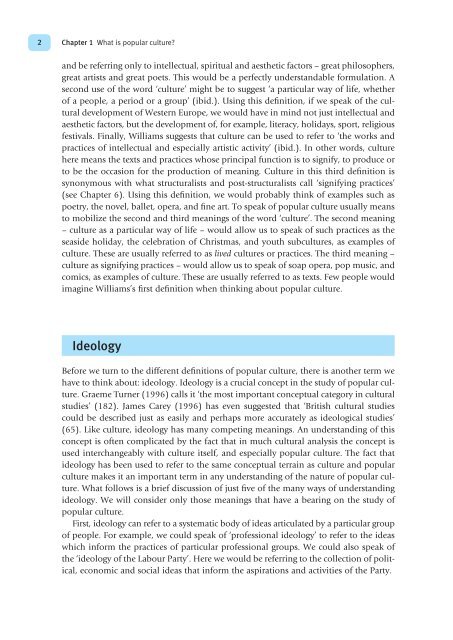Cultural Theory and Popular Culture
Cultural Theory and Popular Culture
Cultural Theory and Popular Culture
You also want an ePaper? Increase the reach of your titles
YUMPU automatically turns print PDFs into web optimized ePapers that Google loves.
2<br />
Chapter 1 What is popular culture?<br />
<strong>and</strong> be referring only to intellectual, spiritual <strong>and</strong> aesthetic factors – great philosophers,<br />
great artists <strong>and</strong> great poets. This would be a perfectly underst<strong>and</strong>able formulation. A<br />
second use of the word ‘culture’ might be to suggest ‘a particular way of life, whether<br />
of a people, a period or a group’ (ibid.). Using this definition, if we speak of the cultural<br />
development of Western Europe, we would have in mind not just intellectual <strong>and</strong><br />
aesthetic factors, but the development of, for example, literacy, holidays, sport, religious<br />
festivals. Finally, Williams suggests that culture can be used to refer to ‘the works <strong>and</strong><br />
practices of intellectual <strong>and</strong> especially artistic activity’ (ibid.). In other words, culture<br />
here means the texts <strong>and</strong> practices whose principal function is to signify, to produce or<br />
to be the occasion for the production of meaning. <strong>Culture</strong> in this third definition is<br />
synonymous with what structuralists <strong>and</strong> post-structuralists call ‘signifying practices’<br />
(see Chapter 6). Using this definition, we would probably think of examples such as<br />
poetry, the novel, ballet, opera, <strong>and</strong> fine art. To speak of popular culture usually means<br />
to mobilize the second <strong>and</strong> third meanings of the word ‘culture’. The second meaning<br />
– culture as a particular way of life – would allow us to speak of such practices as the<br />
seaside holiday, the celebration of Christmas, <strong>and</strong> youth subcultures, as examples of<br />
culture. These are usually referred to as lived cultures or practices. The third meaning –<br />
culture as signifying practices – would allow us to speak of soap opera, pop music, <strong>and</strong><br />
comics, as examples of culture. These are usually referred to as texts. Few people would<br />
imagine Williams’s first definition when thinking about popular culture.<br />
Ideology<br />
Before we turn to the different definitions of popular culture, there is another term we<br />
have to think about: ideology. Ideology is a crucial concept in the study of popular culture.<br />
Graeme Turner (1996) calls it ‘the most important conceptual category in cultural<br />
studies’ (182). James Carey (1996) has even suggested that ‘British cultural studies<br />
could be described just as easily <strong>and</strong> perhaps more accurately as ideological studies’<br />
(65). Like culture, ideology has many competing meanings. An underst<strong>and</strong>ing of this<br />
concept is often complicated by the fact that in much cultural analysis the concept is<br />
used interchangeably with culture itself, <strong>and</strong> especially popular culture. The fact that<br />
ideology has been used to refer to the same conceptual terrain as culture <strong>and</strong> popular<br />
culture makes it an important term in any underst<strong>and</strong>ing of the nature of popular culture.<br />
What follows is a brief discussion of just five of the many ways of underst<strong>and</strong>ing<br />
ideology. We will consider only those meanings that have a bearing on the study of<br />
popular culture.<br />
First, ideology can refer to a systematic body of ideas articulated by a particular group<br />
of people. For example, we could speak of ‘professional ideology’ to refer to the ideas<br />
which inform the practices of particular professional groups. We could also speak of<br />
the ‘ideology of the Labour Party’. Here we would be referring to the collection of political,<br />
economic <strong>and</strong> social ideas that inform the aspirations <strong>and</strong> activities of the Party.
















